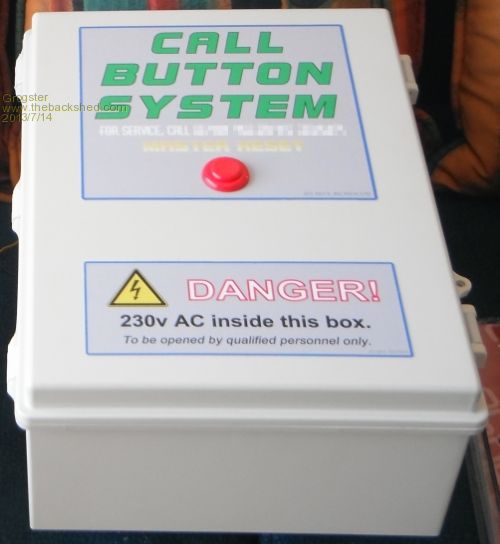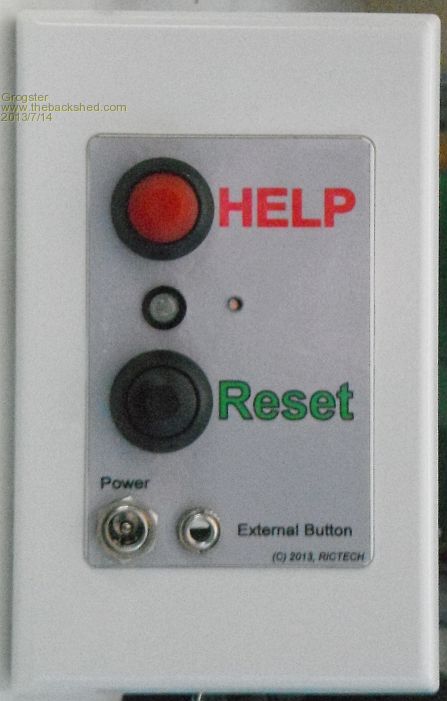
|

|
Forum Index : Microcontroller and PC projects : Discharging laminating pouches...
| Author | Message | ||||
Grogster Admin Group Joined: 31/12/2012 Location: New ZealandPosts: 9308 |
Hi all. 
Not exactly a MM or microcontroller question, but I am laminating front decal labels for finished projects. This involves printing the decal out at maximum quality, on 100gsm matte paper, then laminating the print to give both a glossy finish, and also the laminate protects the printed image, making it hard wearing. This works really, really well, but the main problem I always have is static electricity on the laminating pouches. It's incredible - the pouch sticks to me, the desk, the paper I am trying to place in it.... A REAL pain in the arse. Has anyone else had this issue with laminating pouches? How do you go about discharging the bloody things? I have tried the obvious - holding onto the pouch with one hand, and touching something earthed with the other hand, but it NEVER helps. I love the result from laminating the decal printouts, but the static cling problem is really "Annoying" me in a big way. Perhaps there is a simple solution to this that I have not thought of? Smoke makes things work. When the smoke gets out, it stops! |
||||
| paceman Guru Joined: 07/10/2011 Location: AustraliaPosts: 1329 |
Graeme, try wiping it over both sides with a just damp cloth that has been rinsed in water with some dish-washing detergent in it. Another better one if you're an old LP record buff is to use the record wiping solution that used to come with those round 'corduroy' record wipers (I've still got mine  ) )
I was also told once that reasonably intense UV light (from a lamp) would do it - it might also make the plastic brittle though. Greg |
||||
| BobD Guru Joined: 07/12/2011 Location: AustraliaPosts: 935 |
I don't have your problem with my laminating pouches, not even when the humidity is low. It may be a problem with a particular brand. I use the TDE brand which is a house brand of Big W in OZ. Big W is owned by Woolworths. If you have Woolworths (or Big W) over there then they may sell them. The other thing is do what Greg suggested, get the humidity up. I like your idea. I've been looking for a way to do just the same thing. Thank you. |
||||
MicroBlocks Guru Joined: 12/05/2012 Location: ThailandPosts: 2209 |
I am setting up something to make full color front plates. It is rather a elaborate process as i first have to coat aluminum, then make a mirror print with special ink and then heat transfer it. I rather skip that process and do something that involves less special equipment and your idea sounds good. Does it hold up to UV? I mean the colors stay good or do they slowly fade away? If you drill holes in it, for mounting a switch or led, does the paper within the laminate not start to absorb moisture and discolor? Microblocks. Build with logic. |
||||
Grogster Admin Group Joined: 31/12/2012 Location: New ZealandPosts: 9308 |
Hi folks. With respect to the questions on the concept: I have been using this idea for years, and I have never had ANY delaminations or colour fading etc. But this is inside - I would not expect a decal like this to work outside - the moisture(and probably UV too) would get to it. I use "Jac" paper - double-sided sticky A4 sheets to make the decal sticky. So, what happens is, if I can get the artwork in the laminating pouches without the pouch sticking to me all the time  , I place TWO copies of the decal back to back inside the pouch and laminate that. , I place TWO copies of the decal back to back inside the pouch and laminate that.
Once done, cut the laminated pouch open. Each one will then have nice glossy finish, and is hard wearing against fingernails etc, but the back of the decal will be normal matte paper. Peel the backing off one side of a sheet of A4 "Jac" paper, and place the Jac paper sticky-side up on the table. Place one end of the decal laminate on the edge of the Jac paper, and roll it down onto the sticky side(I actually used a paint-roller) - hold the free end of the decal in one hand, drive the roller with the other - this method prevents air-bubbles getting under the label. Cut up all the labels. Each one now is ready for punching, and has it's own sticky adhesive for placing on the finished project. Cutting holes in the laminated label is easy as pie with the aid of a set of hole-punches. You just line up the punch with the label on a wooden block, double-check alignment, then thwack the hole punch. I use a tack-hammer - no need to get to carried away with weighty hammers. A "Short, sharp shock" does the trick. Don't hit the punch too hard, just give it a quick-fire whack, and the punch cuts through everything in one go. I use timber for the wood - you want something that is reasonably tough as a punching bed. Custom-wood(that stuff made from compressed and epoxied sawdust) is too soft, and crinkles the decal when the punch goes though it. I generally make sure the surface to stick to is clean by wiping with Isopropyl first, but Meths would be OK depending on surface. I will find some images and upload some here, so you can see the finished result. Smoke makes things work. When the smoke gets out, it stops! |
||||
Grogster Admin Group Joined: 31/12/2012 Location: New ZealandPosts: 9308 |
Here is a couple of photos of finished labels on products. 

Both these labels were designed using Front Designer decal software, and produced using the method listed above. These are two different products. The call-buttons system box does not use the wall-plate units, it was just the two photos I found first. These photos do not really do the result justice - the photos are a bit grainy and washed out. The actual result looks better then these photos, but the shots will give you an idea anyway, of what the finished result looks like. Smoke makes things work. When the smoke gets out, it stops! |
||||
| greybeard Senior Member Joined: 04/01/2010 Location: AustraliaPosts: 161 |
Hmmmm, static electricity problem, hmmm. You're not wearing silk boxers and leather chaps are you 
ps. nice labels and apart from the static issues, sounds like a nice idea. |
||||
Grogster Admin Group Joined: 31/12/2012 Location: New ZealandPosts: 9308 |
I DO like Judas Priest music, but I don't think I am a Rob Halford in that respect!  Smoke makes things work. When the smoke gets out, it stops! |
||||
bigmik Guru Joined: 20/06/2011 Location: AustraliaPosts: 2914 |
Lads, I too have used this method for several years... I havent had any fading but NOTHING I made is outside. I always leave the paper label a little bit smaller than where I trim the plastic to stop water/moisture ingress... If I have a Switch cut out I cut the paper a bit LARGER before laminating for the same reason If I want it for a display I cut the size I want and the clear plastic works as a window..... You can always mark on the backside with a permanent black marker to disguise the clear edges where the paper is cut shorter. Regards, Mick EDIT*** I havent experience much static (except the two sides of the plastic to itself but that is GOOD. Mik Mick's uMite Stuff can be found >>> HERE (Kindly hosted by Dontronics) <<< |
||||
Grogster Admin Group Joined: 31/12/2012 Location: New ZealandPosts: 9308 |
My laminating pouches stick to everything, but also to themselves, yes. Why is that good, Mick? Crackle, crackle, crackle, when I peel the two halves apart - not a good time to be going near any CMOS I would think... 
Personally, I find it just a pain the arse, as I have to keep moving the plastic pouch around to get it to lie flat. Static charge also attracts dust and hair from our dog and cat, and this sticks to the plastic like glue. Any laminated label that has a hair sealed in with the label, is a write off, and can't realistically be used. Thankfully, this has not happened that often, but the pouches are like magnets to animal hair. I guess at the end of the day, it is all in the technique - I am quite keen to try the slightly damp cloth mentioned by paceman. Smoke makes things work. When the smoke gets out, it stops! |
||||
bigmik Guru Joined: 20/06/2011 Location: AustraliaPosts: 2914 |
Hi Groggy, Because they will stick and not peel apart after lamination... Mick Mick's uMite Stuff can be found >>> HERE (Kindly hosted by Dontronics) <<< |
||||
| MM_Wombat Senior Member Joined: 12/12/2011 Location: AustraliaPosts: 139 |
Hi all, Found this info.. An antistatic agent is a compound used for treatment of materials or their surfaces in order to reduce or eliminate buildup of static electricity generally caused by the Triboelectric effect . Its role is to make the surface or the material itself slightly conductive, either by being conductive itself, or by absorbing moisture from the air, so some humectants can be used. So, I assume , the water with a little dishwashing liquid, would work a treat. Regards Dennis. PS. I work in a screen printing / digital workplace, and work with self adhesive label material all the time (1000mm to 1600mm wide). We generally, just use an anti-static roller, or spray with some anti-static spray. Keep plugging away, it is fun learning But can be expensive (if you keep blowing things up). Maximite, ColourMaximite, MM+ |
||||
MicroBlocks Guru Joined: 12/05/2012 Location: ThailandPosts: 2209 |
Grogster, thanks for the detailed explanations. I have some testing to do. :) Microblocks. Build with logic. |
||||
Grogster Admin Group Joined: 31/12/2012 Location: New ZealandPosts: 9308 |
Glad you find it useful. 
I'm not the only one to think of this - Mick mentioned he uses the same method. Seems to work very well though. Just one note: Don't be tempted to just use glossy photo paper and NOT laminate - the image gets covered in fingerprints, and starts to rub off. Also, glossy photo paper is thicker - normally about 225gsm, which, when laminated and a layer of sticky paper added, makes the label very thick overall, and it tends to want to come unstuck and warp under it's own tension. However, 100gsm matte photo paper works a treat. Basically, the thinner the matte paper, the better, really, in this application.  Smoke makes things work. When the smoke gets out, it stops! |
||||